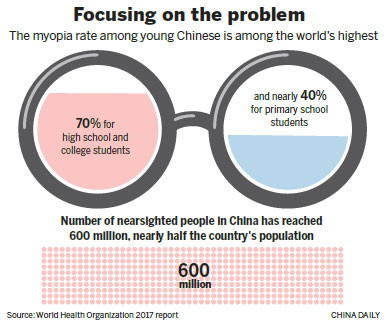More measures eyed to stem myopia woes
Time spent on electronic devices fuels concerns
Faced with increasingly high rates of myopia among young Chinese who may be spending too much time indoors and glued to electronic devices like mobile phones and tablets, health and educational authorities are calling for measures such as exposing more students to natural light to better protect their eyesight and guard against the major eye disorder.
"Long hours spent on doing homework indoors, rather than being outside in natural light, is one of the major reasons for the high rates of myopia, or short-sightedness, among Chinese children," Chen Ruru, an eye specialist and assistant director with the optometry department at the Zhejiang Eye Hospital in Hangzhou, capital of Zhejiang province, told China Daily.
"The major difference between Chinese children and those in foreign countries, such as Australia, lies in the fact that Chinese kids spend far less hours outdoors each week," Chen said.
Myopia, also known as nearsightedness, is an abnormal eye condition in which light rays from distant objects are focused in front of the retina instead of on it, so that the objects are not seen clearly.
The myopia rate among young Chinese is already one of the highest in the world - at 70 percent for high school and college students and nearly 40 percent for primary school pupils - according to a World Health Organization report in 2017. The number of nearsighted people in the country has hit 600 million, nearly half of the total population, according to the WHO.
At this year's Chinese People's Political Consultative Conference annual session, which started on Sunday in Beijing, Wang Ningli, a member of the top political advisory body, called for a national strategy and comprehensive effort involving the whole of society to curb the increasing rate of nearsightedness.
Levels of nearsightedness are now very severe across the country and many children in kindergarten have myopia, with affliction rates also high among juveniles, said Wang, who is also director of the ophthalmology department of Beijing Tongren Hospital.
"We need to take a comprehensive approach because there is no one single solution to the problem now," Wang said. "We also need to tackle the problem early, before children are old enough to go to school."
In August, the Education Ministry together with related departments issued a guideline aimed at protecting students' eyesight by limiting the use of electronic devices in homework assignments. Teachers should assign paper-based homework and limit the use of electronic devices in their lessons, according to the guideline.
Similarly, teachers should not use messaging apps to assign homework, the ministry has said.
In one of the latest efforts to help prevent students' eyesight from deteriorating, Zhejiang educational authorities on Feb 14 issued a consultation notice on banning teachers from assigning homework via mobile apps.
In principle, students' homework should be done on paper and schools should not become overreliant on electronic devices and mobile apps in assigning homework, according to the authorities.
They also aim to deploy more eye specialists to schools at all levels in the province, recording the rate of myopia among students and using it as a way to track the performance of local governments.
The move has received mixed response from parents, teachers and students, with some claiming that the communication devices have become an indispensable part of people's daily life.
"I definitely welcome such moves as nowadays my son is spending too much time staring at things such as the phone screen, or playing video games on the laptop. But my only concern is that such measures may fall short as nowadays schools all rely heavily on WeChat groups and other mobile phone apps to give assignments," said Hangzhou resident Zheng Jianjuan, mother of a 10-year-old boy.
Zheng's son, a fourth-grade student at a primary school in Hangzhou, said completing daily schoolwork through a mobile phone provides a fast and convenient way to study.
"Nearly all the classmates in my class have a mobile phone, it's really easy and fun to finish homework on the phone and play some video games afterwards," said the boy, who did not want to be named as he was commenting on his classes.
The student said he usually spends 15-20 minutes a day to complete his English homework through an online learning platform and his mother is able to communicate with his English teacher to learn about his progress via the app.
His parents will not allow him to play video games on the phone, the boy said, but many of his classmates are "simply addicted" to those.
Outdoor solution
In November, UK media pointed to a study in the British Journal of Ophthalmology medical publication that recorded a reduction in the risk of children developing myopia if they spent more time outdoors.
In the study, which examined more than 1,000 cases, researchers found that while genetics were a factor in the health condition, "controllable" environmental factors such as playing video games were also behind the likelihood of a child becoming short-sighted.
Those who played video games in early adolescence were at a proportionately higher risk of developing myopia, which researchers suggested was linked to spending less time on outdoor activities.
"So for kids, to better protect their eyesight, more time outdoors is vital for their growth, especially in terms of eyesight," Chen from Zhejiang Eye Hospital said.
"My daughter will be attending a primary school this year. I hope she can go to a school where classrooms are equipped with glass roofs so that students can enjoy more sunlight during lessons. This will definitely help their eyesight," she said.
mazhenhuan@chinadaily.com.cn


(China Daily 03/05/2019 page3)


















